“Standing there hand in hand, we stared at the first coach, old questions renewed in our eyes. We looked up to the sky and looked behind us.”
***
January 13th, 1982.
We were born the year the war ended, and we grew up with our home along this railway. We have not seen a moving train before, have never felt what Mama called the gust of wind running with the trains, flattening on faces and bodies. What we see are three coaches of what used to be a train. They say that many persons –– men and women and children — who were fleeing the North during the war were massacred in the train to which these coaches belonged. They also say that the coaches –– joined together — came down the railroad on their own with those dead bodies and just stopped there close to a little building, stood there three kilometers from our neighborhood. Like an undertaker waiting for a corpse to arrive. And no train has ever come through again.
Going down three kilometers to play is not for us. Mama would not hear of it. But, Kaki, our dog, seemed to love it down there. We would often hear him bark from there — a muffled cry that sounded as though he had been whipped. And whenever Kaki came back, Mama forbade us from touching him until she must have rubbed her blessed oil on his head. “The spirits of the dead are always guarding their death place,” she whispered to us once. We felt that she read the question in our eyes.
The morning Kaki disappeared from home and never returned, we found out that that answer was not enough. By evening, we were brave enough to go down. Or we were foolish.
As I picked pebbles along the way, you skipped on the rail tracks. The noise from the neighborhood died as if it had been covered in a blanket. The sky foamed and it grew grey. Standing there hand in hand, we stared at the first coach, old questions renewed in our eyes. We looked up to the sky and looked behind us. From where we stood, the neighborhood was a sunken mountain of zincs. The air started feeling chilly; you suddenly pointed to the little building. I could only catch a glimpse of a shadow that flickered across the wall deeper into the building. I was going to ask what it was when you ran past me, calling “Kaki! Kaki!”
“Uzochi, wait.” You did not hear. Your back had disappeared. Night was on our heels. I followed. When I reached the door, I looked up to see a sign: STATION SUPERINTENDENT. A bunch of keys were hanging on the board on which these faded words were written. I entered to find you standing there in the middle.
“Can you feel it?” you asked.
“Feel what?”
“I feel like there are eyes watching us here. Don’t you feel another presence?”
“We need to go. Kaki will find his way back. Come.”
We were close to the door when the last sunlight receded from the sky as though a hand had covered the sun. A voice whispered my name just then. I turned.
“What?” you asked. It took me a few seconds before I said, “Nothing,” because when I turned, I felt I saw a figure, like a child, with corn row, with a face with no eyes. And then, the wind rose, beating at the loose zincs. From then we could not hear anything more but noise like that of a million cats crying.
“The zincs!” you screamed to me. When I looked, they were tearing out – or something, a hand, was tearing them out, breathing down heavily on us. I felt bodies against mine like I would feel them in the market. They were cold.
Our legs took us out.
Outside the noise remained in the raging wind, now like a child crying. A fence of dust circled us in, papers and nylons slapping our faces, pebbles rolling away under our feet. When we brought our faces up all we could see were the three coaches there on the tracks, the door to the middle coach open like the arms of salvation. We did not speak. We held hands, our fingers feeling like large beads on a rosary, and we pushed our bodies on a straight line toward the coaches.
Once you got on you stretched your hand to drag me up. When I took your hand something began to pull my dress. It felt chain-strong. I could not lift my body to follow your pulling. Once you screamed, “Climb in!” I turned my face to the back and there, standing in the midst of the wind were figures, four of them – two big and two small figures. I could see their faces but there were no eyes. I could see that the big two had loads on their heads but there were no hands. They just stood there, their whiteness flowing down like long legs to the ground, their lips sagged like tired curtains, looking at me without eyes, pulling me with their gaze until the wind roared and wrapped them up in spiraling whites. It was then that you dragged me in.
There was a door. We drummed it shut.
Inside, it smelled of rotten fish. The seats were all torn up, the foams underneath bare like fresh wounds. The heavy dust on the windows could not allow a view outside. When I looked at you, you had tears in your eyes. I was going to say something to you, and then I began to hear it. The jingling of keys, a bunch of keys. A murmur was following its steady sound.
“Let’s go ho.…” Something fell on your shoulder. We threw ourselves aside and screamed the roof of our mouths open. Then we turned to open the door we had entered through. It could not open. The coach started to rock, first back, then forth. Forcefully forth. My head went against the door. There was no pain.
Back and forth. Back, forth.
I felt crippled. Then it stopped. We stopped too. The murmuring started again and now I could tell what it was — a child stifling a cry.
“Papa Nnukwu?” The voice was calling for its grandfather. The jingling of the keys resurged and then I felt arms around me. I almost pushed you to the floor. The voice and the jingling were drawing nearer. I threw my arms around you too.
“Papa Nnukwu, where are you?” We were shaking, both of us. Then it emerged from the door leading to the coach by the right: a small figure, white throughout, without arms and with no showing legs. Its head was bent to the left side as though the neck was broken. It stopped. We knew that it had seen us. Something came along from behind it and sat right beside it on the floor. Intense cold grasped the whole space. I could feel the ice crawling all over the windows, the seats and us. The figure resumed its glide toward us, the thing by its side following. When they got close, we saw that it was Kaki, his eyes blazing a mixture of red and green, by the side of this small see-through figure. The face and the body were that of a little girl. The face had no eyes.
“Where is Papa Nnukwu?” It was the voice of a girl but it was Kaki’s mouth that moved with this question. Have you seen him?”
We could not talk, our teeth were crashing against each other. We held on to our bodies.
“Where is he?” There was impatience in the tone. I shook my head once, my neck stiff.
From somewhere around the figure a bunch of keys emerged, jingling, gliding in the air toward us.
“He is still locked inside? Take. Go and save him before they burn the house.”
The key hung there and as though its jingling was a call, three figures flowed like smoke out of the little girl — the same big two, their loads still on their heads, and another small one. They cast their faces on us, waiting for us to take the key.
“Taaake….”
My hands were unwrapping when the door burst open behind us. In the dark, when I turned, all I could see was a yellow light. The light came close enough to us, we felt arms wrapped around us. In the stench of the space I smelled Mama. We heard her voice, filled with plea: “Bikonu, Adaeze leave my children and me alone. The war took our father. You cannot find him again. Ezigbo nwanne, let your sister live in peace.”
The woman figure, she hesitated. Then she turned; and the other three with her. They all glided away slowly as the light in Kaki’s eyes began to die.
“Amaka? Uzochi?” Mama’s voice came as she shook us.
We felt empty, our heads alien, still looking at the bunch of keys in the air.
**************
Post image by jimmy brown via Flickr.
About the Author:
 Osinachi is a poet, play writer, short story writer, essayist and visual artist. His works have appeared in literary outlets within and outside Nigeria.
Osinachi is a poet, play writer, short story writer, essayist and visual artist. His works have appeared in literary outlets within and outside Nigeria.


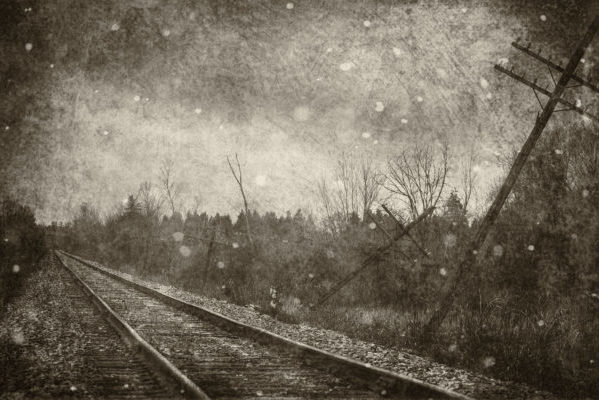
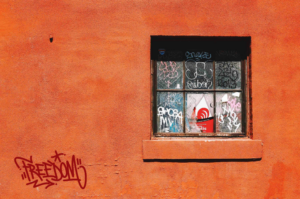

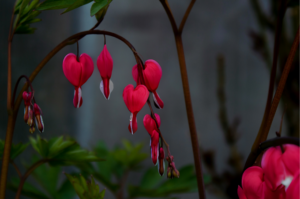
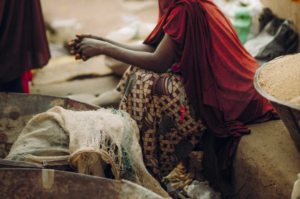
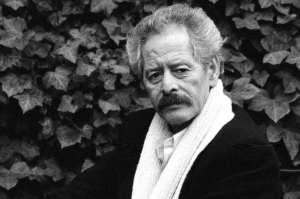
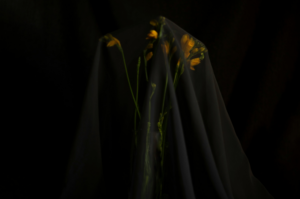

Catherine O February 23, 2017 06:39
Yes! Love seeing horror on this forum. So much packed into the scene. "Deliciously creepy" sums it up quite nicely